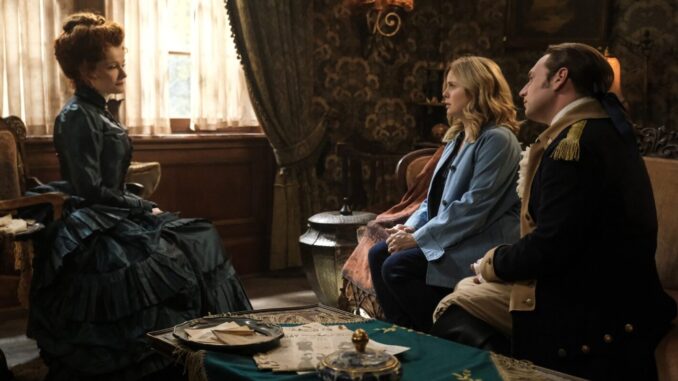
The spectral tapestry of "Ghosts," woven with threads of humor, heart, and historical whimsy, thrives on the secrets lurking within its eternally youthful (or, rather, eternally dead) residents. Each ghost, a poignant time capsule of a bygone era, carries a specific trauma or unresolved longing, making any hint of a deeper connection between them a tremor across the mansion's ethereal foundations. When Rebecca Wisocky, the magnificent embodiment of the buttoned-up Gilded Age matriarch Hetty Woodstone, dangles the tantalizing possibility of Flower's return and its link to Hetty herself, it's not merely a spoiler; it’s an invitation to unravel layers of the show’s most intriguing mysteries.
Flower, the free-spirited hippie who met her untimely demise via lightning strike during a drug-fueled commune gathering, has been a beloved, if often-absent, presence. Her barefoot wanderings, her "peace and love" mantra, and her accidental revelations have always provided a unique counterpoint to the mansion's more grounded (or, again, grounded-in-death) residents. Her absence, following the brief resolution of her unfinished business, left a palpable void. Flower embodies a particular brand of unresolved innocence – her death sudden, her life marked by a search for freedom that perhaps never truly coalesced. Her return, therefore, isn't just about bringing back a fan-favorite; it's about reigniting a storyline that holds the potential for profound emotional depth.
And then there is Hetty, the great-great-aunt, a woman whose Victorian sensibilities are as rigid as her corseted posture. Wisocky imbues Hetty with a captivating blend of haughty superiority and surprising vulnerability, her sharp wit often masking a deep, unspoken pain rooted in the societal constraints and personal betrayals of her life. Hetty is an anchor in the ethereal realm, a guardian of tradition who, ironically, died from a cocaine overdose after a tryst in the very mansion she now haunts. Wisocky’s portrayal ensures that Hetty is never a caricature, but a complex woman slowly learning to shed the expectations of her era. When an actor of Wisocky's caliber, so intimately connected to the character's psyche, speaks of such a link, it's less a casual remark and more a shamanic drumbeat heralding a significant narrative shift.
The "link" between Flower and Hetty is where the speculative heart of this revelation truly beats. On the surface, two characters from such vastly different eras, representing antithetical societal values, seem impossible to connect. Flower, a symbol of liberation, psychedelics, and communal living, stands in stark contrast to Hetty, the embodiment of propriety, rigid class structure, and patriarchal adherence. Yet, it is precisely this dramatic contrast that makes the hinted connection so compelling.
One possibility is a direct, albeit improbable, past connection. Could Flower have, in her youthful rebellion, stumbled upon some forgotten truth about Hetty's life, or even the Woodstone estate, that Hetty herself suppressed? Perhaps Flower, in her free-spirited wanderings, uncovered a secret that was then buried, much like the bodies and scandals of the Gilded Age. This could manifest as a flashback, where Flower's living self, or even a memory of her, unearths a crucial piece of Hetty’s untold story – a scandal, a hidden love, a moment of profound vulnerability that Hetty has spent eternity repressing.
More likely, and perhaps more potent, is a thematic or symbolic link. Both Hetty and Flower died on the property, burdened by their own specific forms of unresolved business. Flower sought peace and understanding, perhaps escaping an equally rigid, though different, set of societal expectations in the 1960s. Hetty, meanwhile, was constrained by the iron-clad rules of her time, forced into a marriage and a role that offered little genuine fulfillment. Perhaps Flower's "return" isn't a physical one, but a spiritual or narrative one, where the lessons or secrets of her life, or even the circumstances of her death, become a key to unlocking Hetty's remaining emotional chains. Could Flower's journey toward self-acceptance, even in death, mirror a path Hetty still needs to walk?
Consider the power of shared secrets. Hetty, for all her bluster, has shown glimmers of regret and a deep-seated loneliness. If Flower’s story, or something she witnessed, holds a key to understanding Hetty’s husband, Elias, or another dark corner of the Woodstone lineage, it could force Hetty to confront a past she’d rather keep entombed. The link might not be direct interaction but rather a shared resonance, two distinct melodies from different eras converging on a single, harmonious (or dissonant) chord of unresolved human experience. Flower's death, marked by a pursuit of altered consciousness, could somehow shed light on Hetty's own drug-induced demise, connecting their final moments in an unexpected echo.
Ultimately, Wisocky’s hint is a masterstroke of storytelling. It reignites speculation, deepens the lore of the mansion, and promises to weave together seemingly disparate lives into a richer, more intricate tapestry. The illustrative power lies not just in the potential plot twist, but in what it signifies: that even across centuries and vast cultural divides, the human experience of longing, regret, and the search for peace remains universally potent. Flower's return, linked to Hetty, isn't just a revelation of history; it's an exploration of how the past, no matter how distant, continues to shape the present, even for those who are eternally stuck in it. It promises to be a poignant reminder that even the most unlikely pairings can reveal the most profound truths.